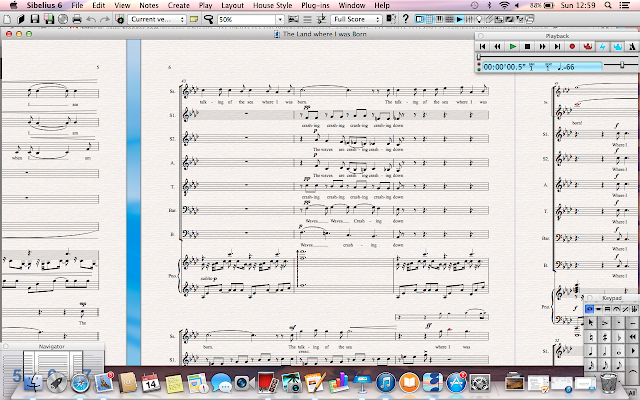- So yes, as I write this post I'm technically not at the festival yet, and it does in fact start on Monday morning - but I'm currently in Heathrow departure lounge, and I thought, since I've got the time to kill I'll give you a bit of run-down of everything I'm been preparing for since I found out I was selected in April.
 |
| "I'm leaving.... on a jet plane!" (although I know when I'll be back again...) |
 |
| Opening page of my commissioned piece |
- Thankfully, for the 'new-to-composing' computer programs like Sibelius have added benefits of warning you when something is written 'out-of-range'' for the instrument (although, these are just guides, sometimes things are possible.... this is why we still research!)
Since I was one of the last to be selected for this workshop, that meant I was one of the last to get my commission. I found of on the 7th of April, and my initial draft piece needed to be in by the 27th April. In composer speak 3 weeks is a tight deadline, even for just a draft (the final piece was handed in 11th May), especially when you have a vague brief. I've done work before when you literally have 24 hours to get a piece done, but those usually come with an incredibly specific brief (instruments, time, genre, feel, hit-points etc etc) which is much easier to deal with.
- When it comes to writing music, whether it's classical or songwriting, the main question that always gets asked is, "What do you write first?!" - Well, there's a simple answer to that.... whatever comes to mind first! And it really depends on what type of writer you are, as well as the genre you work in. Some of the high-end classical genres like 'serialism' require a much more mathematical approach than my style which is about singable melodies (in essence, the 'old-grey-whistle test' principal) Interestingly, although I'm a song-writer and favour choral music, most of the time I tend to write melody and harmony before lyrics. I find that, if the melody is good, the lyrics will come.
 |
| An example of one of my pieces being edited on music writing program 'Sibelius 6' |
- 9am-12pm: Composer Presentations and Colloquium (which is fancy speak for 'academic seminar')
- 1-3pm: Lectures/Seminars from various visiting performers, composers and educators
- 3.30pm-6.30pm: Hour long rehearsals with ensembles (for performance of commissioned piece), or lessons with an assigned tutor, or time to do some writing (or sleeping!)
- 7.30/8pm-9.30pm: Concerts, Open Mics etc
That's a lot of composing based stuff to be doing everyday, although not all of it every day, we are going to have some afternoons to ourselves. And to add to the fun, as part of the 'presentations and colloquium', each selected composer has to give a 20-25minute presentation on their work - Any of you that read my previous blog-post about performance anxiety (http://www.lydian-modes.blogspot.com/2015/04/performance-anxiety-agony-and-ecstasy.html) will remember that I don't really do so well when it comes to public speaking. This is the bit I'm scared about. I have done some serious prep on this bit, and will need to do quite a bit leading up to it when I get to the workshop. Thankfully, my presentation isn't until Friday the 26th June, so I've got a good chunk of time still to sort myself out and prepare properly (and learn from watching everyone else's!) There's no denying, this workshop is going to be jam-packed with things to do and learn, and I have to say I am rather excited about immersing myself back into the nerdy world of intense composing. Sure, I spend a lot of my time working and writing from home, but this is taking me back to my MA days at Leeds College of Music, where writing music was the entire aim of the course, and in fact, this will be more intense: two weeks of hard-core composing, 7-10 hours a day!
Bring it on!
No comments:
Post a Comment